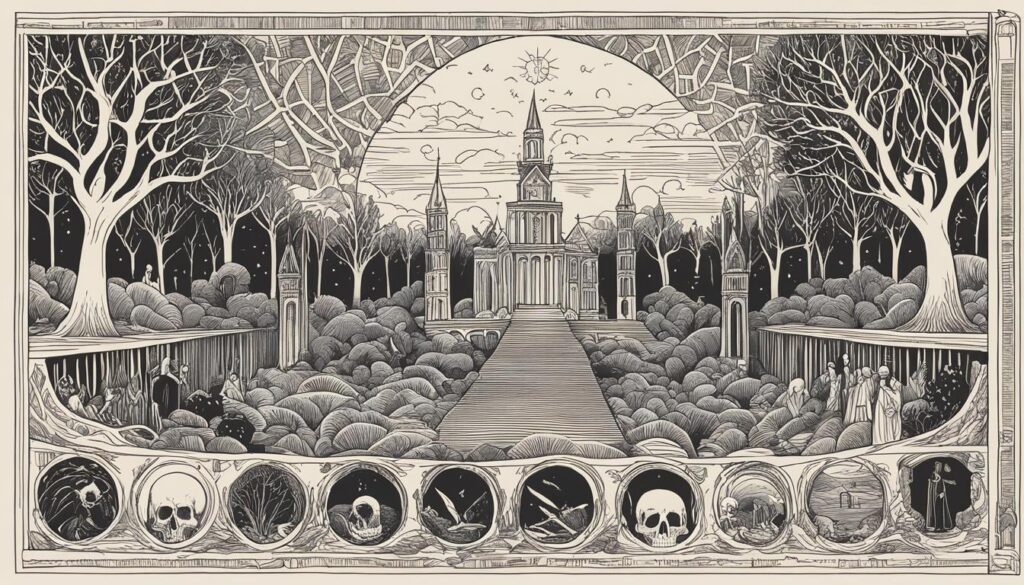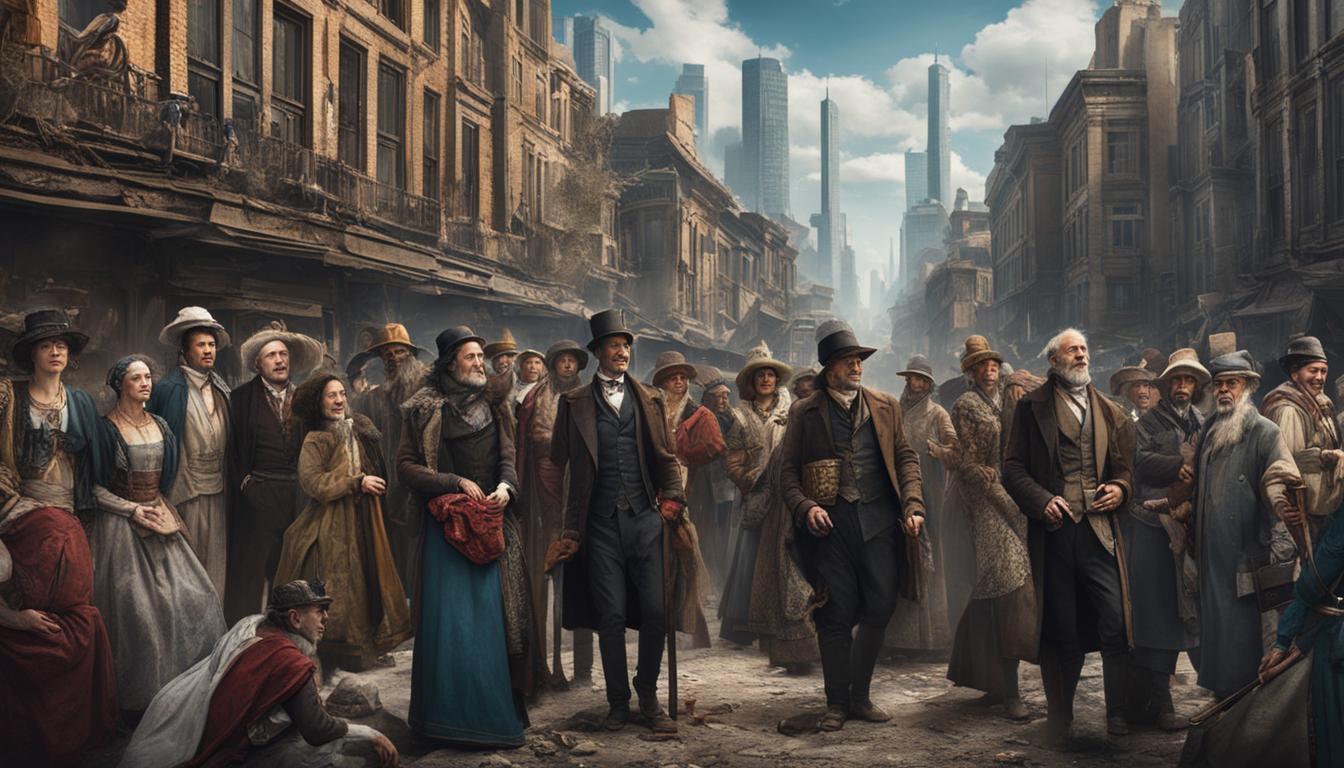Are you looking for an intriguing audiobook to add to your library? Consider Kevin Brockmeier’s “The Brief History of the Dead.” In this audiobook review, we’ll explore the background of the author, Kevin Brockmeier, and provide a synopsis of the plot. We’ll also look at the key themes, characters, narration, and production quality, while evaluating Brockmeier’s writing style and language choices. We’ll discuss the emotional impact and reader response, as well as any critical reception and awards received. We’ll analyze its impact and legacy, and make recommendations for readers who might enjoy this audiobook experience. Finally, we’ll examine the cultural significance and relevance of “The Brief History of the Dead,” providing a forum for discussion and analysis. Check out the image below to see the audiobook’s cover.
About the Author: Kevin Brockmeier
Kevin Brockmeier is an American author and writing professor. Born in Little Rock, Arkansas in 1972, he earned his B.A. from Southwest Missouri State University and his M.F.A from the Iowa Writers’ Workshop. Brockmeier is best known for his works of fiction, including novels, short stories, and essays.
He began his writing career with the publication of his story collection “Things That Fall from the Sky” in 2002. His first novel, “The Truth About Celia,” gained critical acclaim and was named as one of NPR’s Best Books of the Year in 2003. Since then, Brockmeier has authored several other notable works, such as “The Illumination,” “A Few Seconds of Radiant Filmstrip,” and of course, “The Brief History of the Dead.”
Brockmeier’s writing has been recognized with multiple prestigious awards, including the O. Henry Award, the Pushcart Prize, and the Borders Original Voices Award. He has also been a finalist for both the National Magazine Award and the The New Yorker’s Best Debut of the Year Award.
As a professor, Brockmeier has taught creative writing at various universities, including the Iowa Writers’ Workshop, Goddard College, and Bennington College.
Synopsis of “The Brief History of the Dead”
The novel “The Brief History of the Dead” by Kevin Brockmeier is a captivating exploration of the relationship between life and death, memory and forgetfulness, and love and loss. The story follows two interconnected worlds: the world of the living, and the world of the dead, which exists as a shared memory of all those who have previously died.
At the heart of the novel is Laura Byrd, a young scientist who becomes stranded in Antarctica due to a sudden global pandemic. As the world outside collapses, and the population dwindles, Laura finds herself struggling to survive in a harsh, isolated environment while memories of her past life and loved ones keep her going. Meanwhile, in the world of the dead, those who are remembered remain immortal, living on in the collective memory of the living.
The novel beautifully explores themes of love, loss, memory, and the power of human connection. As Laura’s journey unfolds, readers are taken on a deeply emotional and thought-provoking journey that questions the nature of human existence and our relationship with the world around us.
Main Themes in “The Brief History of the Dead”
| Theme | Description |
|---|---|
| Life and Death | The novel explores the interconnectedness of life and death, and questions what it means to truly be alive. |
| Memory and Forgetfulness | The power and fragility of memory is a recurring theme in the novel, with the world of the dead existing as a shared memory of all those who have previously died. |
| Love and Loss | The emotional impact of love and loss is explored throughout the novel, with Laura’s memories of her past life and loved ones driving her to survive in a harsh, isolated environment. |
| Human Connection | The novel emphasizes the importance of human connection and the ways in which people are connected, both in life and in death. |
In summary, “The Brief History of the Dead” is a captivating and thought-provoking novel that raises existential questions about the nature of life and death, memory and forgetfulness, and love and loss. It is a beautiful exploration of the human experience that is sure to leave a lasting impact on readers.
Characters in “The Brief History of the Dead”
Kevin Brockmeier’s “The Brief History of the Dead” features several key characters that play an important role in the audiobook’s narrative. These characters exist in two distinct worlds that are interconnected through death and memory.
The most prominent character is Laura Byrd, a researcher stationed in Antarctica who becomes stranded in the harsh environment following a catastrophic event. Laura’s journey through the frozen tundra is a central focus of the audiobook, and her search for answers about her past and the nature of the afterlife drives the plot forward.
Another important character is the City, a sprawling metropolis that exists in a realm known as the City of the Dead. The City is populated by the spirits of the recently deceased, who remain there as long as a living person remembers them. As the number of living people dwindles, the City also begins to shrink, leading to a sense of unease and impending doom.
The City is also home to a number of secondary characters, including Isla, a young girl who becomes Laura’s guide and confidante, and Simon, a man who has been dead for many years and has become renowned in the City for his exploits and adventures.
Through these characters, Kevin Brockmeier creates a vivid and compelling exploration of life, death, memory, and the human experience. Each character serves an important role in the audiobook’s overall themes and messages, and their journeys and interactions provide both emotional weight and intellectual stimulation for listeners.
Narration and Production Value
Kevin Brockmeier’s “The Brief History of the Dead” is brought to life in the audiobook version, thanks to the exceptional narration and impressive production value. The narrator, Susan Ericksen, captivates listeners with her clear and emotive delivery, bringing the characters and their experiences to life with great skill. Her expressive tone enriches the audiobook experience, making it a pleasure to listen to.
Furthermore, the production value of the audiobook is exceptional. The sound quality is excellent, enhancing the overall listening experience. The audiobook is well-paced, with no awkward pauses or abrupt changes in tone, resulting in a smooth and enjoyable narration of the story.
The attention to detail in the production value and narration make the audiobook both immersive and entertaining, elevating Kevin Brockmeier’s work to even greater heights. Overall, “The Brief History of the Dead” audiobook is an excellent adaptation of the book and a must-listen for those looking to experience the story in a unique way.
Themes Explored in “The Brief History of the Dead”
Kevin Brockmeier’s “The Brief History of the Dead” explores many thought-provoking themes and messages that resonate with readers. One of the primary themes is the interconnectedness of life, as the story depicts how the living and the dead are intertwined. The novel also delves into the consequences of individual actions, as characters in the book are forced to face the consequences of their actions during life. Another key theme is the power of memory, as the memories of the dead continue to influence and shape the world of the living.
Furthermore, the novel touches upon the fragility of life and the inevitability of death, as the dead exist in a sort of limbo until they are forgotten by the living. Additionally, the story highlights the human desire for connection, as many characters grapple with isolation and the longing for human companionship.
The novel’s exploration of these themes and messages adds depth and complexity to its plot and characters, making it an engaging and thought-provoking read for anyone interested in literature and fiction.
Writing Style and Language
Kevin Brockmeier is known for his unique and distinct writing style, which is evident in “The Brief History of the Dead.” His prose is lyrical, poetic, and evocative, with a focus on sensory details and vivid imagery. Brockmeier’s language choices are often unconventional, but they create a dream-like quality that draws the reader into the narrative.
The novel alternates between a first-person and third-person point of view, adding depth to the characters and their experiences. The use of multiple narrators allows Brockmeier to explore different perspectives and themes, creating a complex and layered story.
The language in “The Brief History of the Dead” is rich, but not overly complex or difficult to understand. Brockmeier uses metaphors and similes to great effect, creating connections between seemingly disparate ideas and concepts. His writing is imaginative and thought-provoking, inviting the reader to engage with the story on a deeper level.
Overall, Kevin Brockmeier’s writing style and language choices in “The Brief History of the Dead” are powerful and effective, adding to the emotional impact of the narrative. His prose is poetic without being pretentious, creating a captivating reading experience.
Plot Development and Pacing
Kevin Brockmeier’s “The Brief History of the Dead” features a unique and complex plot structure that keeps readers engaged throughout. The story is divided between two parallel worlds, the City and the other side, connected by the memories of the recently deceased. The narrative pacing in the audiobook version is steady and deliberate, allowing for the full impact of the story’s emotional moments to be felt.
The plot development in “The Brief History of the Dead” is intricately crafted, with a series of seemingly unrelated events that converge in surprising and satisfying ways. Each character’s storyline is thoughtfully woven together, resulting in a cohesive and impactful narrative. Additionally, the use of alternating perspectives provides a deeper understanding of the characters and their motivations.
Overall, the plot structure, pacing, and narrative development in “The Brief History of the Dead” are all expertly executed, creating a deeply satisfying reading experience.
Emotional Impact and Reader Response
One of the most striking aspects of “The Brief History of the Dead” is its emotional impact on readers. The story grapples with themes of loss, memory, and the afterlife, evoking a range of complex emotions within readers.
The novel’s exploration of the afterlife, in particular, is inherently thought-provoking and deeply moving. Kevin Brockmeier presents a version of the afterlife that, while entirely fictional, feels both believable and emotionally resonant. As readers follow the novel’s various characters and their journeys through this afterlife, they can’t help but be moved by the ways in which their stories intersect and the impact their lives have had on one another.
Overall, “The Brief History of the Dead” is a novel that demands reflection and self-examination from its readers. It raises profound questions about what it means to be alive and to leave a mark on the world, and invites readers to consider their own legacies and the ways in which they hope to be remembered.
Comparisons to Other Works

Kevin Brockmeier’s “The Brief History of the Dead” is a unique and thought-provoking novel that explores the afterlife and the meaning of life and death. While it stands out for its originality, it can be compared to other works in its genre.
One book that shares similarities with “The Brief History of the Dead” is Mitch Albom’s “The Five People You Meet in Heaven.” Both novels explore the idea of an afterlife where people cross paths and reflect on their lives. However, “The Brief History of the Dead” takes a more nuanced and complex approach, examining the nature of memory, the impact of living beings on each other, and the power of connection.
Another novel that could be compared to “The Brief History of the Dead” is “Lincoln in the Bardo” by George Saunders. Both books have a focus on the supernatural and are unconventional in their storytelling approach. However, “The Brief History of the Dead” is more grounded in reality and tackles deeper philosophical questions about life, death, and humanity.
The Brief History of the Dead vs. Similar Books
| Book | Similarities | Differences |
|---|---|---|
| The Five People You Meet in Heaven by Mitch Albom | Exploration of an afterlife where people reflect on their lives and cross paths with others. | Focuses more on personal redemption and learning life lessons. |
| Lincoln in the Bardo by George Saunders | Unconventional storytelling approach that incorporates supernatural elements. | More experimental in style and less grounded in reality. |
While “The Brief History of the Dead” shares some commonalities with other works in its genre, it ultimately stands out for its originality and thought-provoking exploration of complex ideas.
Critical Reception and Awards
Since its publication, “The Brief History of the Dead” has received critical acclaim for its unique and thought-provoking storyline. The novel was a finalist for the Orange Prize for Fiction and the IMPAC Dublin Literary Award, among other honors.
The intricate world-building and exploration of themes such as memory, identity, and death have been praised by reviewers. However, some readers have noted that the novel’s non-linear structure can be challenging to follow at times. Overall, “The Brief History of the Dead” has left a lasting impression on readers and critics alike as a powerful and imaginative work of fiction.
Impact and Legacy
The release of “The Brief History of the Dead” by Kevin Brockmeier had an immediate and profound impact on the literary world, garnering critical acclaim and widespread readership. The novel’s thought-provoking themes, masterful prose, and poignant story have left a lasting impression on readers and critics alike.
Kevin Brockmeier’s unique storytelling ability and vivid imagination have firmly established him as a leading voice in contemporary literature. His works, including “The Brief History of the Dead,” continue to inspire and influence writers and readers around the world.
The legacy of “The Brief History of the Dead” is one of enduring impact and thought-provoking discourse. The novel invites readers to reflect on the nature of life, death, memory, and the human experience. Its exploration of these themes has sparked meaningful conversations in literary circles and beyond, cementing its place in the canon of modern classics.
Reader Recommendations

If you enjoyed the audiobook experience of “The Brief History of the Dead,” here are some other audiobooks that you might enjoy:
| Book Title | Author | Genre |
|---|---|---|
| The Year of the Flood | Margaret Atwood | Science Fiction |
| The Night Circus | Erin Morgenstern | Fantasy |
| Life After Life | Kate Atkinson | Fiction |
These books share similar themes and offer immersive listening experiences. Whether you are drawn to speculative fiction or enjoy character-driven narratives, these audiobooks are sure to captivate and entertain.
Cultural Significance and Relevance
Kevin Brockmeier’s “The Brief History of the Dead” explores the nature of memory, death, and the afterlife through a unique lens that has resonated with readers from various cultural backgrounds. The book’s cultural significance lies in its ability to provide a universal perspective on questions that have puzzled humanity for centuries.
The novel’s themes of interconnectedness and mortality are relevant to people of all ages and walks of life, making it a poignant and thought-provoking work. In a world where people are becoming increasingly disconnected, “The Brief History of the Dead” reminds us of our fundamental interconnectedness and the importance of human connection.
The book also explores the impact of our actions on the world around us, highlighting the consequences that can ripple out and affect others long after we are gone. This message is particularly poignant in today’s society where environmental issues and social justice have become increasingly relevant topics.
Overall, “The Brief History of the Dead” is a culturally significant and relevant work that asks profound questions about life, death, and our place in the world. It is a must-read for anyone interested in exploring the human experience and our shared connection to each other and the world around us.
Discussion and Analysis
Kevin Brockmeier’s “The Brief History of the Dead” delves deep into a host of philosophical and existential themes, making it a thought-provoking and layered work of fiction. The novel prompts a wide range of interpretations and discussions, challenging readers to consider the meaning and purpose of life, death, and the afterlife.
One key element of the novel is the concept of memory and its role in shaping our existence. In the book, memory is portrayed as both a source of comfort and a tool for survival, as well as a harbinger of pain and grief.
The novel also explores the power of belief and its effects on our perception of reality. Through the character of Laura Byrd, who finds herself in an imaginary afterlife based on her beliefs and experiences, Brockmeier suggests that our beliefs can shape our reality. This idea prompts a broader discussion of the nature of reality and the ways in which we construct our own subjective experiences.
In addition, “The Brief History of the Dead” touches on topics such as the environment, consumerism, and spirituality. By incorporating these themes into the narrative, Brockmeier encourages readers to consider the broader implications of their actions and belief systems.
In terms of the writing style and language, Brockmeier’s prose is notable for its lyrical quality and rich imagery. The audiobook version of the novel is particularly effective in conveying this, as the skilled narration enhances the beauty and emotional resonance of the text.
Key Themes Explored in “The Brief History of the Dead”
| Themes | Description |
|---|---|
| Memory | The concept of memory and its role in shaping our existence |
| Belief and Perception | The power of belief and its effects on our perception of reality |
| Reality and Subjectivity | The ways in which reality is constructed based on our subjective experiences and beliefs |
| Environmentalism | The impact of human actions and consumerism on the environment |
| Spirituality and Afterlife | The exploration of spiritual beliefs and the afterlife |
Overall, “The Brief History of the Dead” is a novel that offers ample material for discussion and analysis. Brockmeier’s adept handling of complex themes and his beautiful writing make this audiobook a compelling and meaningful read for anyone interested in exploring the larger questions of life and death.
Conclusion
In conclusion, Kevin Brockmeier’s “The Brief History of the Dead” is a captivating and thought-provoking audiobook. The storyline is well-crafted, the characters are developed with depth, and the themes explored are both timely and timeless. The narration and production quality of the audiobook are top-notch, making for an immersive listening experience. Brockmeier’s writing style is both poetic and accessible, and his use of language adds to the overall emotional impact of the story.
Overall, “The Brief History of the Dead” is highly recommended for audiobook enthusiasts who enjoy works that combine literary elements with a touch of science fiction. It is a truly unique and engaging experience that will leave listeners reflecting on its messages long after it has ended.



